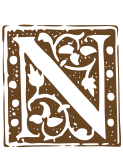



THIS is an extract from In a Name, Chapter 8. The full text can be read in the published version (see Publications, under Home).
Names of places and people — both personal names and family names — are originally derived from descriptions. As such, descriptions stem from the original languages that were spoken at the time of the original naming.
Many place names are derived from the person or group of people who first settled in an area. For example, the origin of the place-
Another fascinating example is Steeple Bumpstead. Originally bune steda, from the Saxon meaning 'a place of reeds' — or more poetically, 'a place of sweet-
The 'steeple' refers to an ancient tower that once stood on the Roman road than ran nearby. Hence, 'Steeple Bumpstead' means 'the place of sweet-
Names may not always be as they appear. For example, 'Chelmsford’ (the county town of Essex) could mean 'the ford over the River Chelmer' — after all, one of the rivers running through the city is indeed the River Chelmer. However, the original name of the Saxon settlement is Cœlmær's Ford — meaning 'the fording of a river at the settlement of a local leader named Cœlmær’. In time, 'Cœlmær's Ford' became 'Chelmsford', and it was the name of Cœlmær that gave the name of the river 'Chelmer’.
Other place names are derived from the Scandinavian languages, after the migrations of the Vikings and Danes during the 9th century (CE). The Danelaw was the area of England stretching north from a line roughly between London and Chester, from the east coast. This included East Anglia and Lincolnshire — hence many names in the area are a mix of Saxon and Scandinavian origin.
But what about people's names? Family names (surnames) as such weren't commonly used until the 18th century. Before then, the common naming arrangement was a 'Christian name' followed by an association. For example, an individual may have been christened 'William’ for a variety of reasons — perhaps the name of the father, or the name of the king, or some other association. Beyond the family unit the person would have been referred to by the Christian name and another association: such as 'William of Farcet', or 'William the smith’, or 'William, Neil's son’. These associations would in time become family names: 'Farcet’, 'Smith’, and 'Neilson’ in these examples.
Personal names originally had a meaning in themselves: they would have been descriptions derived from ancient Greek or other ancient languages. Some Saxon names still are used today, but they may sound quaint — but again, these too were originally descriptions.